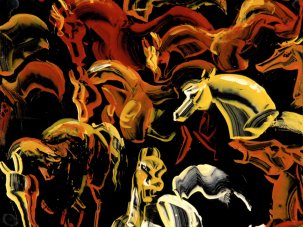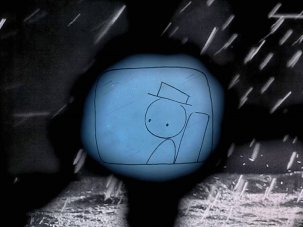Web exclusive
If the salaryman is the most resonant symbol of modern Japan’s social anomie, then Salaryman Man is the most riotous example of that topic’s ripeness for satire. At two and a half minutes in length, the movie is innocuous enough: a camp villain is tormenting two white-collar executives in front of their helpless colleagues, when Salaryman Man – indistinguishable in appearance from the other salarymen on the scene – appears and heroically dispatches the baddie by means of a gun and a business card. The End. But also the start of one of the kookiest careers in contemporary anime.
Takashi Taniguchi has been known to Japanese otaku since Salaryman Man was first uploaded to video-sharing websites – initially Japan’s Niconico, then YouTube – back in 2004. A decade down the line, he’s put out around a dozen more shorts, won awards in Toronto and Zagreb, amassed an international cult following and been invited to brand everything from video games to theatrical productions. Enthusiastic YouTube sharers have turned him into anime’s first viral auteur.
An auteur indeed, for while netizens may have taken over the distribution channels, Taniguchi remains in sole control of every aspect of production. The images, scripts, voices and music in his films are all his – whence springs one of the most distinctive styles in Japanese animation today. Visually rather static, his cartoons are nevertheless distinguished by a zany design in which camera angles are picked seemingly at random and all the characters (which include bears, fish and sundry inanimate objects) have disconcertingly human facial features. The conventions of anime style are abandoned, and only occasionally resurrected to be good-naturedly spoofed.
All these qualities are in evidence in Salaryman Man. It has the off-kilter pace, surreal narrative touches and stuttering, deadpan vocal delivery that make all of Taniguchi’s films such a strange joy to watch. The sluggish frame rate, inexact lip-synching and unmoving characters seem to make a mockery of the low production values of much anime. Yet most interesting is the way in which Taniguchi plays with the received idea of Japan’s uninspired corporate culture. Everybody speaks with the same monotonous voice, there’s no characterisation, and in a brilliantly timed gag the hero’s special ‘Salaryman pistol’ is revealed to be a run-of-the-mill pistol – nothing more. In satirising the absence of individuality in Japan’s modern enterprises, Taniguchi has paradoxically created something wholly original.
The pressures of post-bubble Japanese society come in for some more prodding elsewhere in his oeuvre. In Mr. Stomach (2012), a stomach complains about the cocktails of ramen and beer that overworked employees force upon it. In Mitsuko Uncovered (2006), a girl harassed by her mother for failing to tidy their cramped home escapes into a fantasy world of green pastures and naked bodybuilders. Yet even as the humour turns freakish, sometimes grotesque, the satire remains gentle – which is perhaps why these films are so eminently likeable. The surface style may invite comparison to such unconventional animators as Koji Yamamura (Mt. Head), but the comedy is closer to the warm irony of the How to Anger People series.
As the retirement of Studio Ghibli’s two founding fathers has pundits casting about for new trailblazers in anime, Taniguchi deserves a pause for thought. His style is a world away from, say, the graphical pyrotechnics of Mirai Mizue, and he remains firmly outside the animation studio system. Yet what he lacks in critical recognition, he makes up for in net-ready share-ability: at the time of writing, his Mr. Ando of the Woods (2006) has around five million YouTube views to Mt. Head’s 100,000. In an era when the likes of Microsoft are appropriating anime memes for advertising campaigns, Taniguchi’s infectiously quirky shorts may well point to a future.
-
The Digital Edition and Archive quick link
Log in here to your digital edition and archive subscription, take a look at the packages on offer and buy a subscription.














